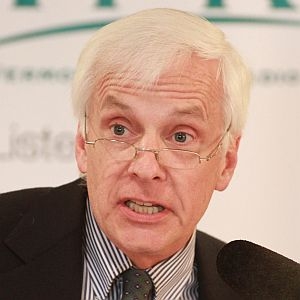 (Host) This week we’re featuring a Sampler of some of the essays
(Host) This week we’re featuring a Sampler of some of the essays
recorded live at the Commentator Brunch earlier this year. For commentator Peter Gilbert, the theme –
"When Worlds Collide" – was all about the Civil War.
(Gilbert) I’m Peter Gilbert and this is called, "Emotions versus Reason and Reality."
What
happens when an irresistible force meets an immovable object? Actually,
the laws of physics make that an impossibility. Something, as they say,
has to give.
OK, but what happens if a nearly irresistible
force meets an extraordinarily intractable object? The answer – a
cataclysm of heat, noise, light, and motion.
One hundred and
fifty years ago, our nation was in the midst of a bloody civil war
brought on when emotions and rhetoric ran ahead of reason and reality,
and when one side considered compromise impossible. Or at least
unacceptable.
Partly due to impassioned editorials in the
southern press and incendiary assertions in state legislatures and
Congress, many Southerners became convinced that President-elect Lincoln
and the Republicans were set on abolishing slavery. This despite
repeated and emphatic protestations to the contrary. In his Inaugural
Address, Lincoln even said he would support a constitutional amendment
that guaranteed the perpetuation of slavery forever in the states where
it existed. But he would not agree to slavery expanding into the
territories.
"Not good enough. I don’t believe it," said the
South. "Lincoln is really a closet abolitionist. Lincoln wants to take
away our slaves. The Federal government has acted unconstitutionally in
numerous ways." And so states seceded.
How could this happen? In
a special address to Congress four months after taking office, Lincoln
said that secessionist leaders had persuaded otherwise patriotic
Americans to take up arms against their government by convincing them of
something that wasn’t true. They invented, he said, "an ingenious
sophism," a false argument
intentionally used to deceive. The sophism
was that secession is neither rebellion nor treason because states
could lawfully withdraw from the Union any time they wanted. This was
neither true nor even logical. But with passions running high, southern
leaders were successful, Lincoln asserted, in what he called (in an
extraordinary phrase) "an insidious debauching of the public mind." The
result was between six and eight hundred thousand dead and a tear in
this nation’s social and political fabric that’s still evident a century
and half later.
Sometimes – perhaps often – we all believe
things because they fortify other opinions we hold or justify feelings
we have. But overheated rhetoric and incendiary assertions have
consequences. Yes, they sell newspapers and advertising; but whenever
incendiary assertions mislead or make compromise impossible, they damage
the nation and its ideals.